13 codes to improve the way you surf, with John John Florence
Interview by Elliot Struck | Photos by Chris Gurney Duckdiving “I just do the New York Shuffle for fun, to be honest,” says John. For those in the fog, John owned a solid seven days of Internet with a video that featured him duckdiving in a pool, in a style he called the New York Shuffle (search: #TOURNOTES). “I’ve done it before to duckdive a big wave, but usually I just think, “Oh god, here comes a big one,” and just duckdive as deep as I can. A lot of people use their foot, but I always use my knee. I push my nose down first on an angle, then kinda scoop with my knee and push my body right down. Then… hope for the best. I don’t open my eyes underwater. You totally can dodge the pillars sometimes, but my eyes get too burned, I’d rather just get worked.” When John Florence arrives in West Oz every year he makes a phone call to the one photographer he’ll shoot with exclusively: Chris Gurney. He’s a gent who’s equally competent behind the camera as he’s reading swell charts and when you’re at someone else’s party you want to know the way to their bar. Paddling “Paddling is just something that kind of comes naturally after surfing for so long,” says John. But what seems natural to John is still of great interest to the everyman (which is why you’re reading this): “I put my fingers together somewhat, but not like, forced together. I have long arms so I reach pretty far up, then my arms go under my board and scoop right out the back.” So, takeaways: Take the time to reach, and try to avoid bending elbows. Work On Wave Selection “There’s not really a trick to it, this is just something that comes with experience and getting used to the ocean and spots you surf,” says John John. Stab shall briefly interject here: Watch the best surfer in the lineup. Try to understand what they’re looking for, and mimic it. “You’ll never be 100 percent comfortable in the ocean, but you start to understand how to figure out banks and reefs, and what they do in what swells. Watching from the land helps a lot. You know those sessions when you get lost? But then you catch a wave, get caught inside for a bit, and when you paddle back out you know where to sit because you’ve just been on the inside and had that new perspective of it.” Talent is only as good as execution, and in a jersey John’s wave selection was his weakest hand when he first joined the tour. Sure isn’t anymore. Make Informed Choices For all its unpredictability, you can still minimise chance when it comes to the ocean. “The west bowl at Teahupoo, that’s just one of those ones that comes from knowing the reef and where you’re at,” says John. “The west ones at Teahupoo are bigger barrels but a lot faster, and the south ones are longer barrels that you get a feel for as they’re coming down the reef. The west ones come out of the channel and the south ones come from up top. These are just things you can learn about a spot like Teahupoo from doing a whole lot of time out there.” John John Florence lives dangerously, not just by flirting with waves like this but earlier in the year he cooly took the backseat to Jack Robinson’s barrel at The Box with a $30k RED camera in his paws. Learn To Fall “That’s a good one to learn,” says John. “It depends on the wave, but if it’s somewhere really shallow, where you’re doing airs into one foot of water, I do what I call a starfish. You just lay all your arms and legs out flat so you don’t go as deep. And bellyflop, if you can. If it’s not too shallow but a bigger wave, you just want to stay calm. I never get in a ball, I just let myself get worked and just think of it as being fun, which relaxes you. I pretend I’m on a rollercoaster.” And here! The beautiful line cut between a make and despair. “I never get in a ball,” says John. “I just let myself get worked and think of it as being fun, which relaxes you. I pretend I’m on a rollercoaster.” Go Back To Basics Remember why we’re all in this game? Fun! “It’s good to take it back to basics every now and then, it keeps it fun if you keep changing it up,” says John. “Just riding different parts of the wave. Floaters are sick! I was watching footage one day and saw a floater, and it just looked so interesting, like riding on top of the barrel. There’s so many different ways to do floaters and cutbacks and simple stuff like that, it’s all fun – mess around and take different lines!” Further to this, if you’re getting jaded, break your on-wave habit. Start trying something you haven’t done for years. You’ll be surprised. West Oz and Hawaii aren’t too dissimilar in John’s eyes. There’s the extra juice which comes from being beaten by a vast ocean, the winds howl sweet music for aerials and there’s enough distance between spots to dilute the crowds. Fun = Improvement If you’re not surfing in competitively aspirational fashion, then pressure has no business being on your shoulders. “I don’t try and get in any particular headspace,” says John. “To this day, I’ve always just had fun surfing. I love to go surfing and mess around trying new things and new lines. I’ve never thought, ‘I need to improve my cutbacks,’ or ‘I need to improve my back arm when I’m bottom turning.’ I’ve just surfed, and had fun. You see a lot of kids nowadays trying to take it too seriously, and it seems like it takes the fun out
Interview by Elliot Struck | Photos by Chris Gurney
Duckdiving
“I just do the New York Shuffle for fun, to be honest,” says John. For those in the fog, John owned a solid seven days of Internet with a video that featured him duckdiving in a pool, in a style he called the New York Shuffle (search: #TOURNOTES). “I’ve done it before to duckdive a big wave, but usually I just think, “Oh god, here comes a big one,” and just duckdive as deep as I can. A lot of people use their foot, but I always use my knee. I push my nose down first on an angle, then kinda scoop with my knee and push my body right down. Then… hope for the best. I don’t open my eyes underwater. You totally can dodge the pillars sometimes, but my eyes get too burned, I’d rather just get worked.”
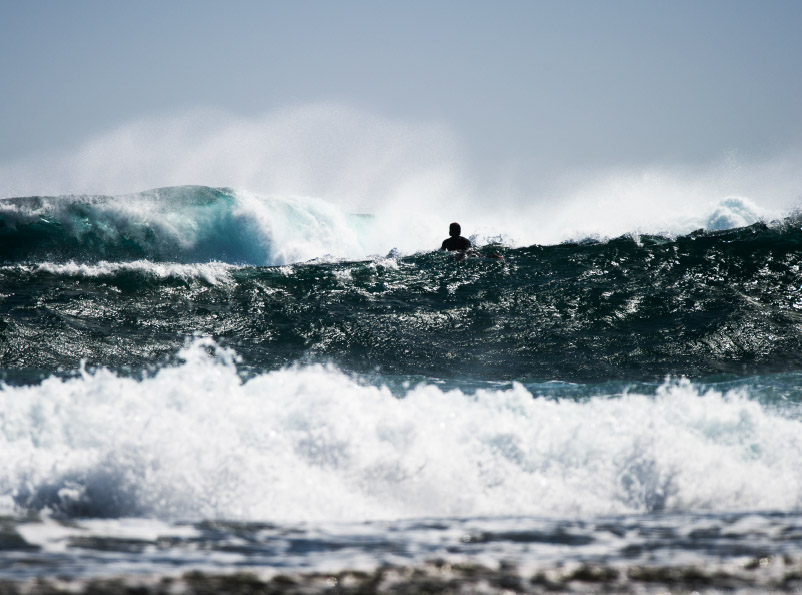
When John Florence arrives in West Oz every year he makes a phone call to the one photographer he’ll shoot with exclusively: Chris Gurney. He’s a gent who’s equally competent behind the camera as he’s reading swell charts and when you’re at someone else’s party you want to know the way to their bar.
Paddling
“Paddling is just something that kind of comes naturally after surfing for so long,” says John. But what seems natural to John is still of great interest to the everyman (which is why you’re reading this): “I put my fingers together somewhat, but not like, forced together. I have long arms so I reach pretty far up, then my arms go under my board and scoop right out the back.” So, takeaways: Take the time to reach, and try to avoid bending elbows.
Work On Wave Selection
“There’s not really a trick to it, this is just something that comes with experience and getting used to the ocean and spots you surf,” says John John. Stab shall briefly interject here: Watch the best surfer in the lineup. Try to understand what they’re looking for, and mimic it. “You’ll never be 100 percent comfortable in the ocean, but you start to understand how to figure out banks and reefs, and what they do in what swells. Watching from the land helps a lot. You know those sessions when you get lost? But then you catch a wave, get caught inside for a bit, and when you paddle back out you know where to sit because you’ve just been on the inside and had that new perspective of it.”
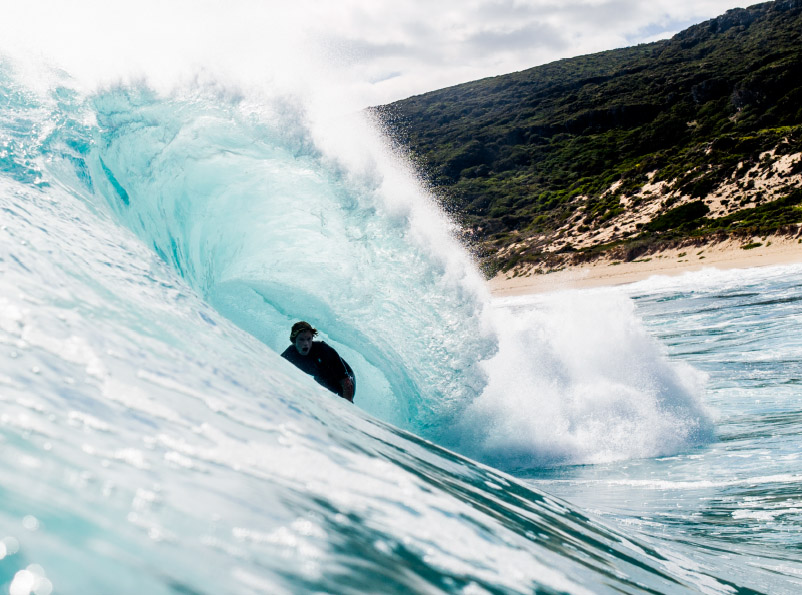
Talent is only as good as execution, and in a jersey John’s wave selection was his weakest hand when he first joined the tour. Sure isn’t anymore.
Make Informed Choices
For all its unpredictability, you can still minimise chance when it comes to the ocean. “The west bowl at Teahupoo, that’s just one of those ones that comes from knowing the reef and where you’re at,” says John. “The west ones at Teahupoo are bigger barrels but a lot faster, and the south ones are longer barrels that you get a feel for as they’re coming down the reef. The west ones come out of the channel and the south ones come from up top. These are just things you can learn about a spot like Teahupoo from doing a whole lot of time out there.”
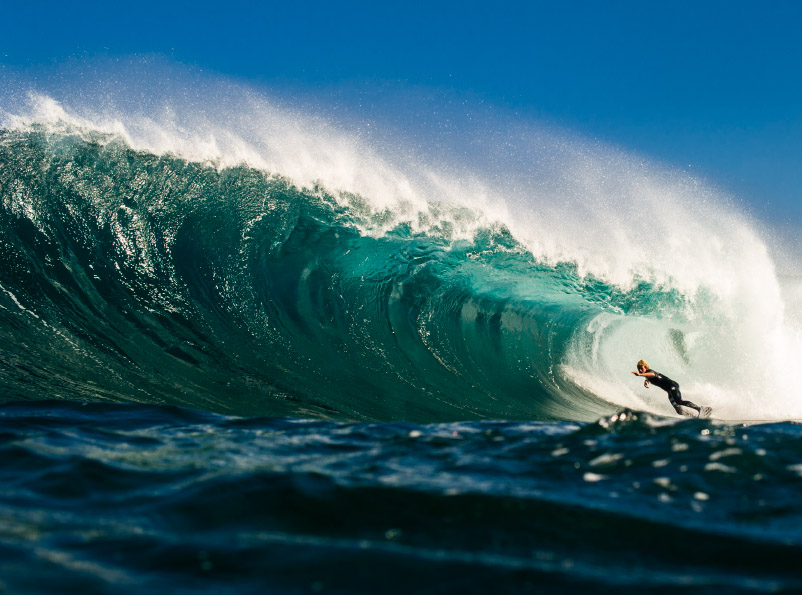
John John Florence lives dangerously, not just by flirting with waves like this but earlier in the year he cooly took the backseat to Jack Robinson’s barrel at The Box with a $30k RED camera in his paws.
Learn To Fall
“That’s a good one to learn,” says John. “It depends on the wave, but if it’s somewhere really shallow, where you’re doing airs into one foot of water, I do what I call a starfish. You just lay all your arms and legs out flat so you don’t go as deep. And bellyflop, if you can. If it’s not too shallow but a bigger wave, you just want to stay calm. I never get in a ball, I just let myself get worked and just think of it as being fun, which relaxes you. I pretend I’m on a rollercoaster.”
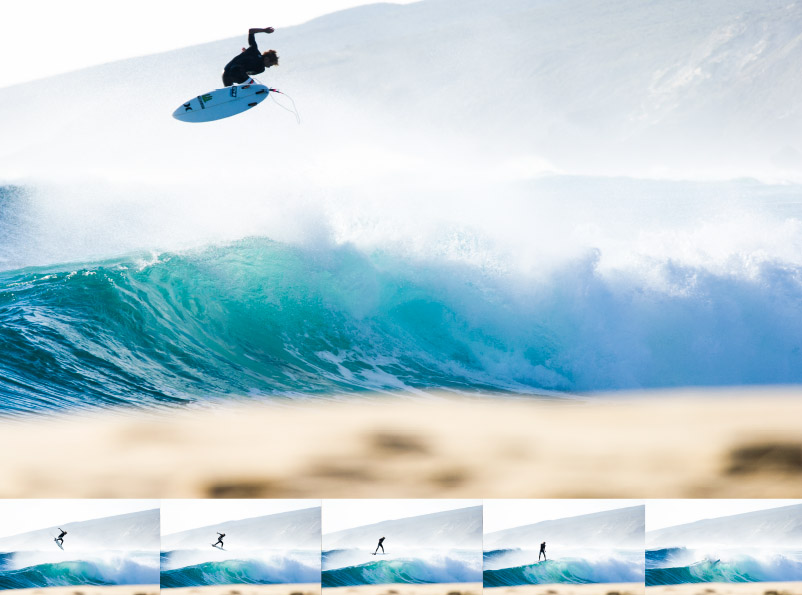
And here! The beautiful line cut between a make and despair. “I never get in a ball,” says John. “I just let myself get worked and think of it as being fun, which relaxes you. I pretend I’m on a rollercoaster.”
Go Back To Basics
Remember why we’re all in this game? Fun! “It’s good to take it back to basics every now and then, it keeps it fun if you keep changing it up,” says John. “Just riding different parts of the wave. Floaters are sick! I was watching footage one day and saw a floater, and it just looked so interesting, like riding on top of the barrel. There’s so many different ways to do floaters and cutbacks and simple stuff like that, it’s all fun – mess around and take different lines!” Further to this, if you’re getting jaded, break your on-wave habit. Start trying something you haven’t done for years. You’ll be surprised.
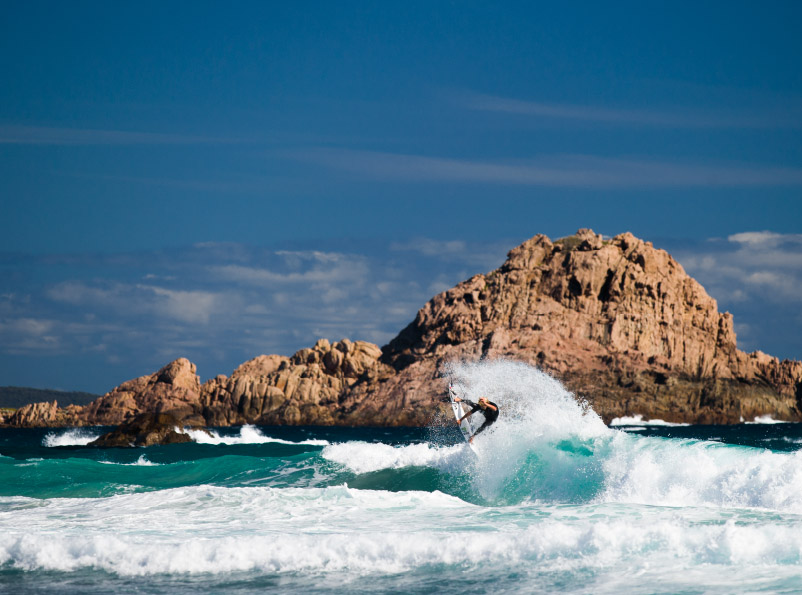
West Oz and Hawaii aren’t too dissimilar in John’s eyes. There’s the extra juice which comes from being beaten by a vast ocean, the winds howl sweet music for aerials and there’s enough distance between spots to dilute the crowds.
Fun = Improvement
If you’re not surfing in competitively aspirational fashion, then pressure has no business being on your shoulders. “I don’t try and get in any particular headspace,” says John. “To this day, I’ve always just had fun surfing. I love to go surfing and mess around trying new things and new lines. I’ve never thought, ‘I need to improve my cutbacks,’ or ‘I need to improve my back arm when I’m bottom turning.’ I’ve just surfed, and had fun. You see a lot of kids nowadays trying to take it too seriously, and it seems like it takes the fun out of it. I don’t agree with the whole gym, training thing. Why wouldn’t you just go surfing? It’s better than fake surfing in a gym. Just go surf!”
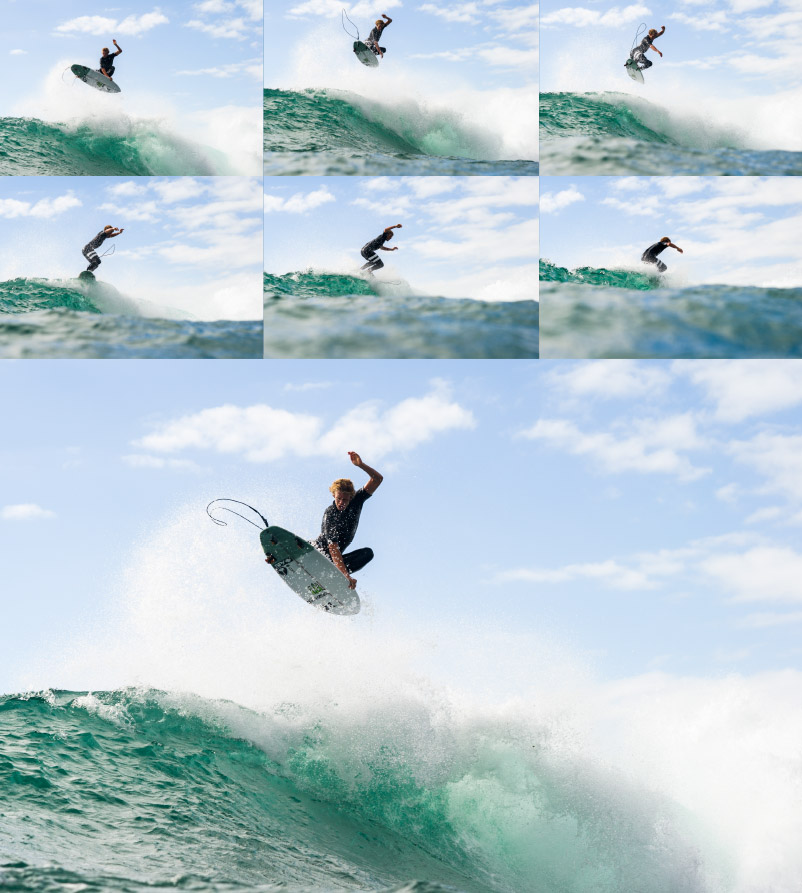
Many would find frustration in a cross-shore, wind affected line-up but john sees opportunity for extra elevation and faster rotation!
Watch yourself
Now, we don’t all have the indulgence of a personal filmer. But nor is it unachievable – gal, friend, there’s options if you really wanna improve. “Watching footage of yourself 100 percent for sure is good for you,” insists John. “You see what looks good, what doesn’t, little mistakes you make and why you made them. It’s mostly so you can see all the mistakes you make and try to fix them, actually. There’s not necessarily things with style or anything that I’ve seen myself doing and thought, “I need to change that,” it’s more in a way of a little mental note. It’s maybe a little thing you see and think, “that would’ve been sick if I’d made it, I’m gonna try that again.” This is about as close to ‘training’ as John gets, and when he and Mick Fanning both practise something, you can be pretty sure it’s effective.
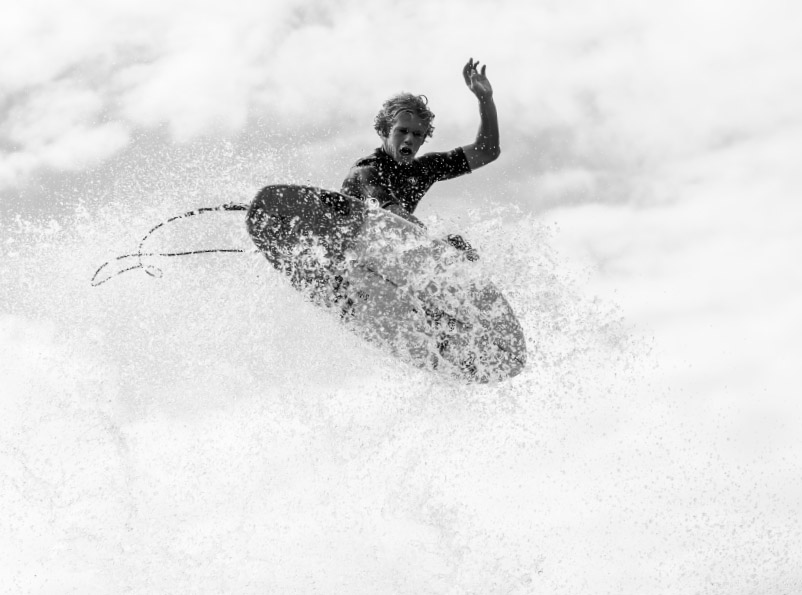
All penetrating eyes and stoic. It’s no surprise John shot for British Vogue earlier this year! Ah, the creative meaningless of when two worlds collided. John, Vogue, don’t ever change.
Surf With Pushers
“This is a huge one,” says John. “Surf with someone who’s going to get you amped up and make you want to go bigger. They get a big barrel, you want to get a bigger barrel. It’s healthy competition… like, freesurfing competitiveness.” And no, that last phrase isn’t oxymoronic.
Know Your Boards
“For surfboards, it’s to each his own,” says John. “Everyone likes something different. For me, I’ve been fortunate enough to work with Pyzel since I was a little kid, and so I’m really comfortable with the boards he makes me. I can tell him, ‘this board sucks,’ or ‘this board works in these kind of waves,’ and he can change it. Communication with your shaper is a big deal.” But just like following a superior surfer around a lineup, there are cues to be taken. “You see what other people are riding and you get an idea.”
Know You Can
Put down the Tony Robins pamphlet and listen to your uncle John: “If I think of a new trick, I just think of it as 100 percent achievable. I always believe that I can learn any trick. But a lot of the time I think, “if I get the section I can do it f’sure,” and then you never end up finding the section for it. That’s surfing.”
Go For It
“Personally, I don’t work up to stuff – I just go for it, try it out and see how it goes,” says John. “Better than wondering.” And might Stab offer that this point is a fabulous metaphor for the game of life as a whole? Don’t let John’s subtle profoundness be lost on you!
Be Psyched On Surfing
“But, be careful – when you’re surrounded by something 100 percent of the time you’re going to get burnt out on it eventually. For me, I find other things to do like photos and skating and sailing, stuff that can take my mind off it when I need to. But watching surfing and surf clips, it gets you amped. It gets you amped to go and try things. It’s just about finding a good balance.”
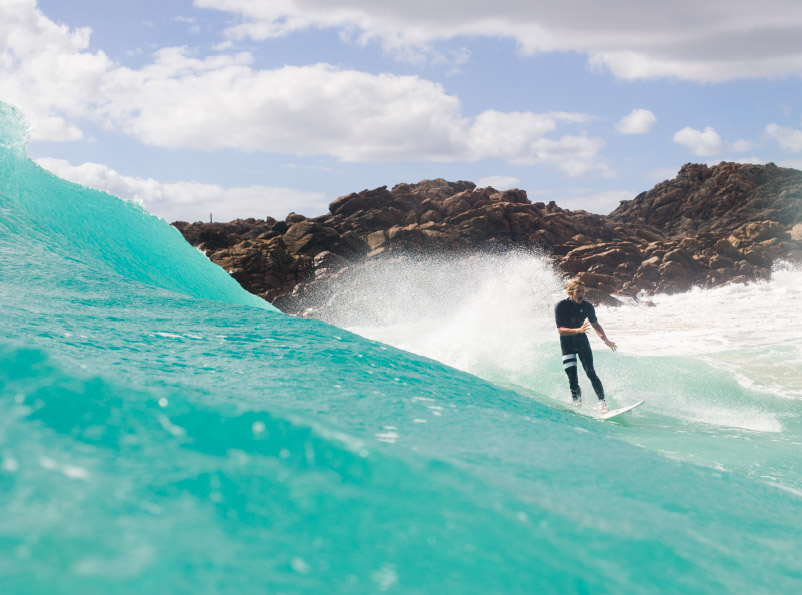
Is there a more beautiful moment of anticipation than this?














Comments
Comments are a Stab Premium feature. Gotta join to talk shop.
Already a member? Sign In
Want to join? Sign Up